Curating the optimal diet for your Betta fish is not merely about providing sustenance but replicating their natural environment. By understanding the dietary preferences of Betta fish in the wild one can tailor their feeding regimen to promote longevity and vitality. This article details the intricacies of a Betta’s diet while cautioning against pitfalls.
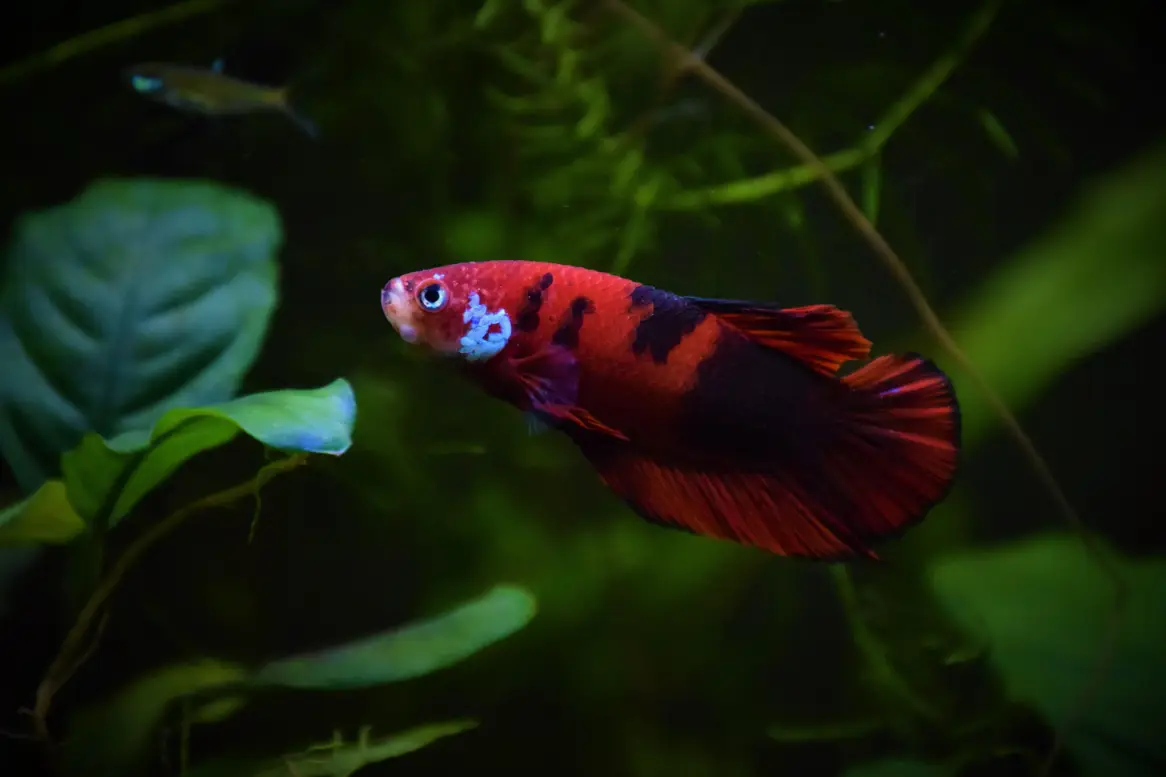
For me, taking proper care of aquarium fish means recreating their natural environment as closely as possible. For example, knowing what kind of food a Betta fish likes to eat in the wild helps me with maintaining ideal conditions for my pet at home.
So what is the best diet for a longevous Betta fish, and what can you feed yours if you’re suddenly out of good food?
Can feeding the wrong things result in tummy problems for your fish?
What do Betta fish consume in the wild?
In nature, Betta fish are insectivores that, given the opportunity, would also consume small invertebrates such as white freshwater worms.
The digestive tract of this carnivorous fish has evolved to process meat and fiber from the chitin exoskeletons of insects. For this reason, the best type of food for a Betta would be tiny insects and crustaceans that are high in protein and fiber.
Betta fish, also popular as Siamese Fighting fish, are native to Thailand. However, they’ve also been spotted in Indonesia, Malaysia, Laos, Cambodia and even Vietnam. If we want to know what the diet of a wild Betta is it makes sense to take a look at the insects that thrive near still bodies of water in these geogprahical latitudes.
Here are examples of what a Betta fish may eat in the wild:
- Cladocera water fleas such as Daphnia
- Artemia Brine shrimp
- Zooplanktonic Rotifers and crustacean larvae
- Mosquito larvae
- Deer fly larvae
- Rice seed midge larvae
- Copepods
- Larvae of Chironomid midges known as Bloodworms
Most of these insects are native to Thailand’s rice fields, the natural habitat of wild Betta fish.
What to feed a pet Betta fish?
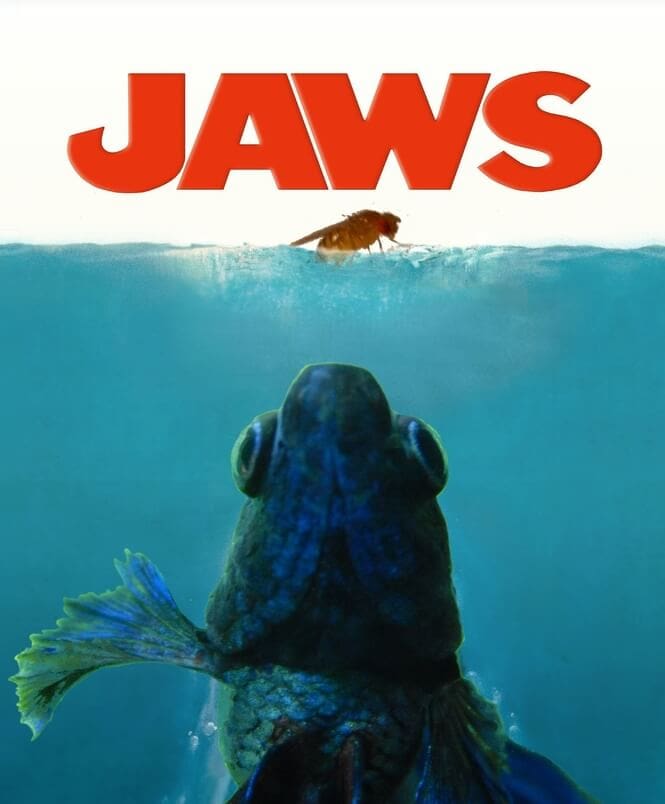
Fortunately, the popularity of Betta fish has made it really easy for us fish keepers to replicate their natural diet in captivity.
You could ask around in your local fishkeeping community and see if there’s a reputable supplier of live fish food that a pet Betta would eat.
Live brine shrimp or bloodworms (midge larvae) are the easiest to find and, also, fantastic nourishment for Betta fish.
However, unless you’ve confirmed the reputation of the seller I would not recommend going for this type of food.
Live foods, cultured in poor conditions, may often introduce parasites to the pet Betta that eats them.
What’s easier to get a hold of and is more on the safe side is freeze-dried live foods. This type of fish food is essentially live insects that have been dehydrated at a low temperature, which results in a safe meal with excellent quality.
Following these thoughts, some of the best food options for a strong and healthy Betta fish would be Mysis shrimp, Brine shrimp, Daphnia water fleas, and Bloodworms.
Here’s a short summary of each of these foods:
- Bloodworms are low on fat and have a higher amount of protein and fiber.
- Brine shrimp have less protein content and less fiber, which makes it a good choice for a staple Betta diet.
- Daphnia are very high in protein, high in fat, and have a decent amount of fiber.
- Mysis shrimp are extremely high on fiber, contain lots of protein and a decent amount of fat.
Based on these summaries and my experience, I’d say that a perfectly balanced diet for a Betta fish would consist of feeding brine shrimp or bloodworms every other day, rotated with Daphnia or Mysis as more fiber-rich alternatives.
I usually choose bloodworms over brine shrimp as the staple meal, because of the higher average fiber and lower average fat contents.
Remember to soak the foods in aquarium water for 10 to 30 minutes before feeding.
In my experience, and I’ve looked after plenty of Bettas, their favorite food from the commercially available ones is Daphnia. Whenever I feed them some fresh live Daphnia, my Bettas would go bonkers for it.
How to feed your pet Betta properly?
Establishing an adequate feeding schedule for your new fish is also crucial to its well-being. Here’s a good example of a weekly feeding schedule for your Betta:
- Monday: Feed bloodworms.
- Tuesday: Feed bloodworms again.
- Wednesday: Feed Daphnia.
- Thursday: Feed bloodworms.
- Friday: Feed Mysis shrimp.
- Saturday: Skip Feeding.
- Sunday: Feed Daphnia.
There are numerous brands that offer the aforementioned foods and frankly, some will be better than others.
What I’ve had success with and would personally recommend are Omega One’s freeze-dried Bloodworms, Mysis shrimp, and this 3-in-1 rotation food pack by Zoo Med (Mysis, Daphnia, and Bloodworms) that you can all get at Amazon.
What about feeding your Betta commercial fish flakes and pellets?
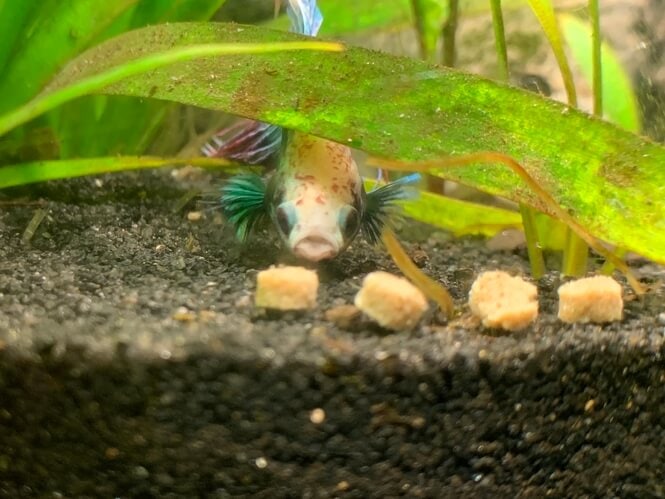
Some people think that freeze-dried live foods should only be offered to a Betta fish as a treat that supplements regular fish food.
However, it may be better if commercial flakes and pellets are entirely dropped out of a Betta’s diet.
Flakes are very dense in nutrients yet dissolve too quickly when inside the stomach of the fish.
This can overload the intestines of a Betta which may slow down the emptying of its stomach and lead to severe bloating.
I’ve seen more than one case of mysteriously bloated Betta fish with buoyancy issues that do not end well, and studies suggest that highly-processed fish food such as flakes or pellets may be the reason.
Anyway, Betta pellets are just compressed flakes and are likely non-beneficial for the digestive tract of a fish in the long run.
Both flakes and pellets may contain various sources of land-based animal meat, along with numerous gluing agents and grains.
None of these have a positive impact on a Betta’s digestive system.
Sometimes the label would mention containing “fish meal”, which may be anything from fish bones to long-stored fish pumped with preservatives.
Some breeders deliberately raise Betta fish on flakes, so that the babies can readily take these processed foods later.
A Betta raised on flakes will immediately accept live food when offered.
However, a specimen that has been raised on live food will often refuse to eat flakes for weeks.
It should be noted that some brands of fish food do use quality whole fish meals in their formulas.
But what should you feed your Betta if you’re suddenly out of the good fish food?
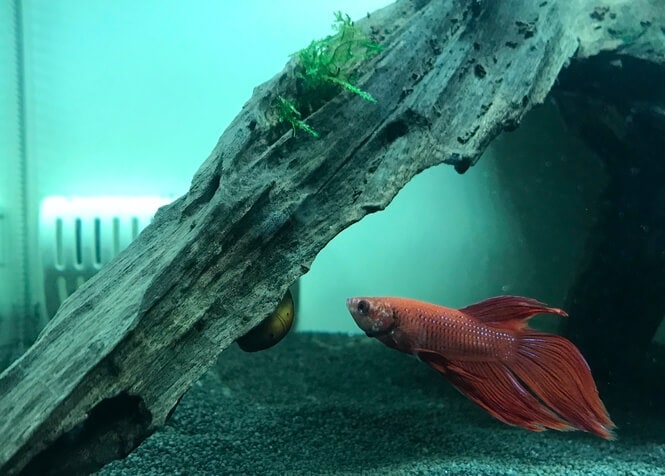
If you find yourself out of Betta food you can use a couple of alternatives as a temporary solution until you get some more of the good stuff.
I should point out that the emphasis here is on “temporary”.
That’s because long-term use of any of the foods discussed below may have adverse effects on a Betta’s digestive system.
Generally speaking, at home you can feed Bettas land insects of many kinds. If you feel adventurous you could collect some ants or even house flies for the fish to snack on. However, avoid feeding your pet Betta spiders or beetles of any kind.
Let’s take a look at the two scenarios:
Feeding other types of fish food to your Betta
If you’re like me, in most cases when you’re out of Betta food you’ll likely be stocked on other fish foods.
You can safely use generic fish food as an alternative to feed your Betta as long as its nutritious formula is designed for carnivorous fish.
For example, Goldfish pellets or flakes contain ingredients for omnivores. A Betta cannot eat these for too long as they do not suit its digestive tract and may lead to stomach issues for the fish.
Most flakes for tropical fish are made with omnivores in mind, so should not be fed to a Betta regularly.
Tropical fish foods may often contain wheat gluten, brown rice, or potatoes, all of which can hinder the digestive system of a Betta fish with time.
Algae wafers are meant for herbivorous fish and should be avoided altogether.
Feeding human food to your Betta
You’d want to avoid feeding your pet Betta any homemade meals designed for human consumption.
Any type of human food would likely have a negative impact on your fish:
Fruits are too acidic and contain too many unnatural sugars for a Betta’s diet.
Meaty vegetables such as cucumbers and peas are okay for a one-time treat as long as they’re boiled and peeled.
These are usually offered as a treatment for constipation in Betta fish, but should not be given on a daily basis as their type of fiber is unnatural for the fish’s stomach.
Any type of land-based meat should be as fat-free as possible, cooked without seasoning, and cut into very small pieces. This means no pork.
A Betta should not really eat bread crumbs or any other homemade or store-bought pastry because these foods contain yeast and gluten.
Yeast expands inside the tummy of the fish which may lead to stomach bloat and serious constipation.
On that note, crackers, biscuits, and other baked bread-like goods are full of useless carbohydrates that won’t be of much use to a pet Betta.
Honestly, if you only have human food at hand and you plan to get some fish-grade one in the next 2 or 3 days, you might as well skip feeding your Betta fish for the time being.
A healthy Betta fish specimen may live for almost two weeks without food.
Occasional fasting is natural for the fish, as they don’t get to eat every single day in the wild.
Do not give in if your pet fish looks hungry and “begs you” for food.
This is normal behavior as Bettas are opportunistic feeders in the wild and will eat whatever is in front of them.
AQUAnswers TIP Some online retailers of pet supplies (e.g. Chewy.com and Amazon) offer auto-shipping.Once I try and see how long a pack of Betta food lasts for me I order the next one with auto-shipping.
This way I never have to starve my pet Betta.
Another benefit of this trick is that, usually, the retailer provides a discount on auto-shipping orders.
A natural diet may help your Betta with fighting off disease
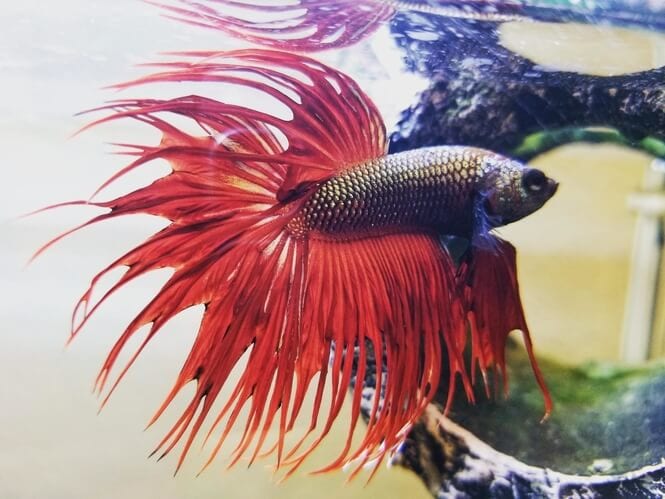
During my research on the perfect Betta diet, I’ve found more than one study such as this one by the NIH that describe the relation between high-quality food and a strong immune system in fish.
Interestingly enough I’ve personally witnessed very ill Betta fish recovering with just a change in diet.
The change was usually moving away from flakes and pellets and only eating frozen dried or live food.
Coincidentally, I’ve rarely heard anyone complaining about their Betta suffering from bloat (which can be lethal), constipation, and even swim bladder disease if a natural menu was followed.
In fact, I have experience in helping fish survive the dreaded freshwater Ich by simply switching their diet to live or frozen dried foods.
All of this suggests that a well-fed Betta fish stands a better chance of living a long and happy life.
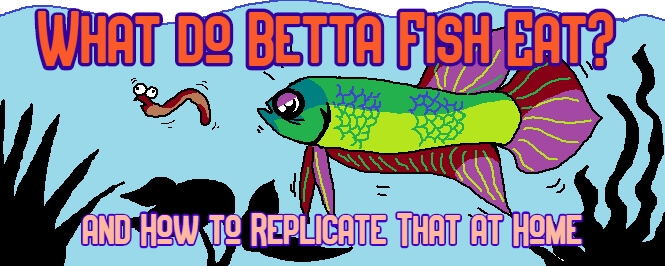
Final food for thought
Replicating what a wild Betta fish would eat in your home aquarium can be an excellent way to provide a happy life for your pet fish.
What type of food did you end up getting for yours?
Tell me in the comment section and share your experience with it.
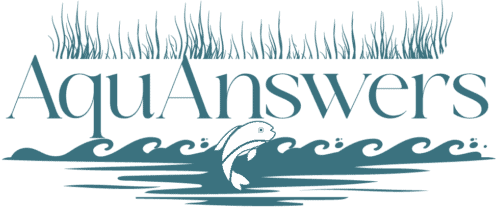
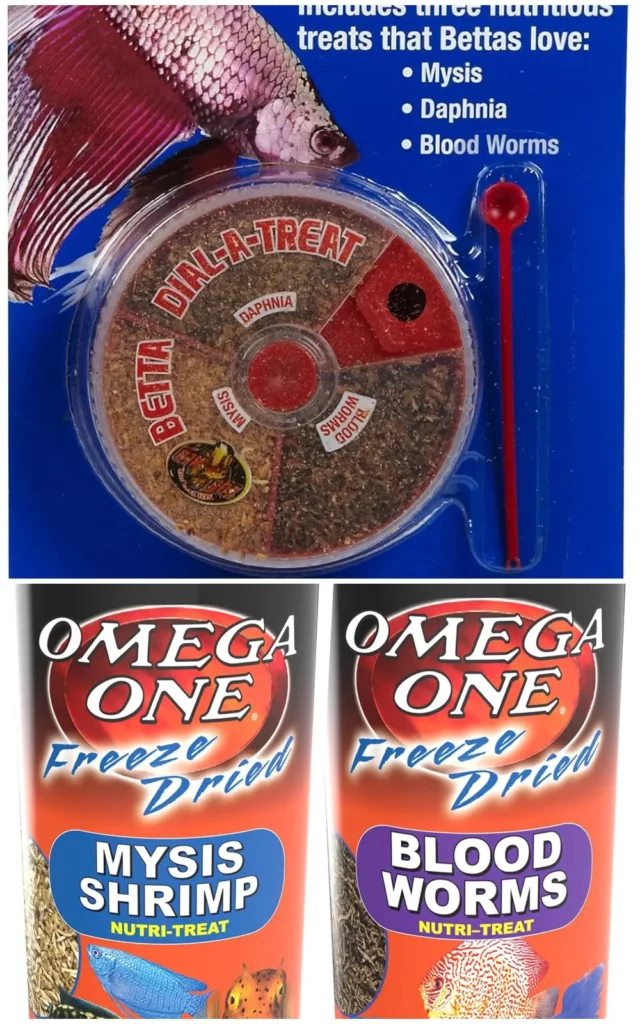
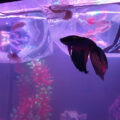

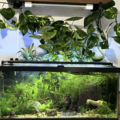
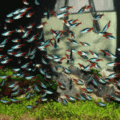
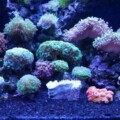
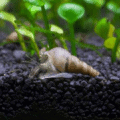
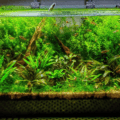
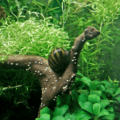
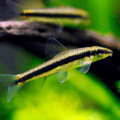
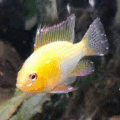
Betta can eat different types of meat, seafood, peas, mango,… So, which foods shouldn’t be given to betta fish?
Hi, I am a new betta fish keeper from Singapore.
1 of my betta fish started with swim bladder disease when i fed it flakes from seachem. It was fine when it was on pellet. the fish right eye seem to be poor, getting sick make it even more difficult to eat the food on the surface.
the fish seem to recover slowly was it is able to swim as usual after 1 or 2 weeks of diet. the condition get worst when I did a major water change.
I started to put the indian almond leafs, it seem to be able to swim without turning sideway. then it started to stay at the bottom of the tank and sleep sideway. I reduce the water level to about 1 gallon from 5 gallon as it seem to have trouble swimming to the surface for food.
I have maintain status quo and using seachem polyguard. it not getting better and only eat seachem flakes as it sink. It just refuse to eat pellet because it does not want to swim to the surface. I try to feed bottle water fleas from UHT but it not interested.
After reading your article, i think it might be nitrate but i am not sure.
Hopefully I can get any advice from you. thank you
Hi,
Never ever reduce the water level in the tank. This can lead to polluted water pretty quickly because smaller water volumes become dirty in no time. Instead, get your Betta a synthetic leaf or another type of platform where the fish could hang out near the surface.
Onto your other questions – it could be anything listed in the article(s) and I can’t really help, as I have no info on what the Nitrate levels may have been, and other tank parameters. Why do you think it could be related to Nitrate?
What a WONDERFUL article you’ve written to help us! We adore our Betta kids but it appears that we’ve not been feeding what’s best for them. We have 6 Bettas. 5, 6.8 gal. tanks & 1, 15 gal.. Each tank has a pleco & a mystery snail. Lots of live plants & each kid has their Betta log, which they really seem to enjoy. We have Betta logs in other tanks too because a number of fish really do use them! We’ve been feeding our Bettas a combo of Hikari Betta Bio-Gold, freeze dried daphnia, & freeze dried & live blood worms. Now, after reading your article, we’ll stop the Betta Gold for certain! That can be eaten by fish in our community tanks. I’ve ordered some Mysis shrimp. Now will feed as you suggest. Makes good sense to us. About freaked when we read the ingredients in our Hikari Betta Bio-Gold! Thank you so very much for enlightening us! We love our finnie babies & want them healthy as possible. Blessings!
Thank you, Margaret, for reading and doing your research!
You’ve nailed 90% of a Betta’s natural diet with your current feeding regimen which is absolutely fantastic.
For me, it’s somewhat hard to believe that certain Betta food manufacturers would go the length of using quality whole fish in their flakes & pellets, but then “fill the gaps” with potatoes, soybean, wheat gluten, etc… It completely defeats the purpose!
Anyhow, I’m really glad that my article had an impact on someone. That’s, in my experience, one less bloated Betta (or 6).
Regards, and don’t forget to share the article with whomever you think may benefit from this info (: